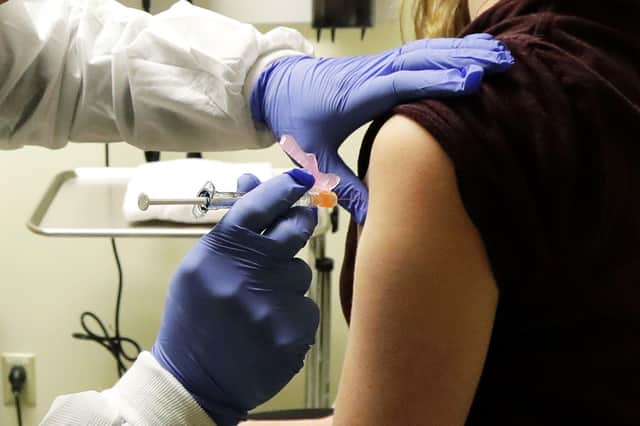Covid-19: Big Pharma's search for vaccine is helping public see it in a different way – Jo Halliday


For many years, the very mention of “big pharma” has raised alarm bells among a large proportion of the public. Damaging headlines concerning profiteering, ethics and price setting, among many other things, have all combined to create a perception that the pharmaceutical industry is more concerned with profits than people.
According to the 2019 Edelman Trust Barometer, just 57 per cent of people had faith in the pharma sector. And yet, here we are in 2020, in the midst of a global pandemic, and countries worldwide are pinning their hopes on the industry finding a solution to life in lockdown.
Advertisement
Hide AdAdvertisement
Hide AdOur latest research by Talking Medicines has shown that while there have been some marginal improvements in perceptions among patients since the outbreak of Covid-19, there are still far more detractors than supporters.
The urgent life and death need from patients to find a vaccine for Covid-19, alongside effective treatment options, is placing the industry under unprecedented levels of scrutiny, from every corner of society. However, this greater level of scrutiny also presents pharma with an opportunity to change the way it is perceived and, more importantly, become more patient-centric in its approach.
While pharma is one of the most regulated sectors in the UK, it also considered to be one of the least transparent.
The sector has traditionally chosen healthcare professionals as the key channel for communication with patients. A lack of direct communication between industry and patient has undoubtedly resulted in a lack of understanding on both sides. The voice of the patient, in particular, has frequently gone unheard.
In recent years, however, the dynamic between pharma and patient has steadily changed. The voice of the patient has increased in volume. A more informed patient has emerged, empowered to ask more questions.
People want to be more involved in their own care plans and the arrival of Covid-19 has served to amplify public interest.
The pandemic has mobilised a new supportive spirit from the public in the search for a vaccine. We are seeing collaboration between pharma companies, rivals we would have never previously expected to work together, and evidence that pharma is going the extra mile to redefine ways of working to get products out to market.
It’s a win/win for everybody at the moment but how can this amazing new spirit of collaboration and innovation be embedded in the post-Covid-19 world?
Advertisement
Hide AdAdvertisement
Hide AdWe don’t want to look back on this era as one of missed opportunity. With the current resolve to try and find vaccines and antigen tests there are so many opportunities for progression.
At the same time, the rise of impact investing, from larger venture capital houses to smaller boutique funds such as SIS Ventures, is helping to fund the development of new patient-first healthcare solutions. The people that are looking on with the most interest are the ones at the heart of everything pharma does… the patients.
Perhaps this new environment will make pharma more comfortable having a conversation with wider society about what they do and how they do it. This is almost certainly a good thing.
People outside the industry don’t fully understand how pharma works. Everyone knows it is expensive to research, develop, trial drugs but no one actually knows how the money is spent in each of these stages and why the cost is so high.
Pharma has the opportunity to take time to realise the importance of working with patients and the mutual benefit this relationship brings to both sides of the table.
Increasing this level of understanding to more effectively empower patients is where technology can help – harnessing data and insight from patients for good.
That’s why, at Talking Medicines, we have tools that capture and structure data to help both patients and the industry. The Medsmart App helps patients better manage their medicines at home and our conversational AI listens to the needs of patients. Together, this data helps pharma better understand the patient voice, ultimately helping to put patients at the very heart of healthcare.
Understanding this data can help build relationships between people, communities and the pharma industry in a more transparent way. Better understanding will inevitably lead to more effective medicines and a healthier society. And who doesn’t want that?
Jo Halliday is CEO and founder of Talking Medicines
A message from the Editor:
Advertisement
Hide AdAdvertisement
Hide AdThank you for reading this article on our website. While I have your attention, I also have an important request to make of you.
With the coronavirus lockdown having a major impact on many of our advertisers - and consequently the revenue we receive - we are more reliant than ever on you taking out a digital subscription.
Subscribe to scotsman.com and enjoy unlimited access to Scottish news and information online and on our app. With a digital subscription, you can read more than 5 articles, see fewer ads, enjoy faster load times, and get access to exclusive newsletters and content. Visit www.scotsman.com/subscriptions now to sign up.
Our journalism costs money and we rely on advertising, print and digital revenues to help to support them. By supporting us, we are able to support you in providing trusted, fact-checked content for this website.
Joy Yates
Editorial Director
Comments
Want to join the conversation? Please or to comment on this article.